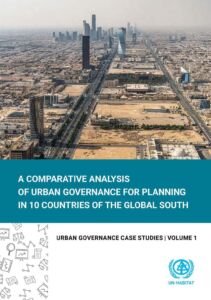A COMPARATIVE ANALYSIS OF URBAN GOVERNANCE FOR PLANNING IN 10 COUNTRIES OF THE GLOBAL SOUTH: URBAN GOVERNANCE CASE STUDIES, VOLUME 1
UN-Habitat supports cities and countries all over the world to strengthen governance by improving the coordination and transparency of institutional frameworks; empowering representatives of urban stakeholders and constituencies through inclusive sound institutions and mechanisms; and providing predictability and coherence in urban development plans to enable social inclusion, sustained, inclusive and sustainable economic growth, and environmental protection. The rationale being that the quality of urban governance is the most important factor for the eradication of poverty and for prosperous cities. UN-Habitat’s Strategic Plan 2020-2023 states that urban and territorial planning and design must be a central component of the renewed urban governance paradigm, which promotes local democracy, participation, inclusion, and transparency to ensure sustainable urbanization and spatial quality.
UN-Habitat has conducted this in-depth study on the state of urban governance for planning in 10 countries in the global South (Afghanistan, Cameroon, Guinea, Niger State, Peru, Saudi Arabia, Somalia, Syria, Tajikistan, and Uganda), with key principles of effective governance as reflected under international commitments such as the New Urban Agenda and the 17 Sustainable Development Goals forming the basis of the analysis. The research findings support previous United Nations studies that found that urban governance systems are currently unfit for purpose and need critical reforms to enable sustainable and inclusive urban development. The findings also serve to inform public officials and other stakeholders working to protect the rights of urban populations on possible actions to improve urban governance. Developing solutions to urban challenges involves several interacting factors and actors, making desirable outcomes hard to achieve and predict. Maximizing the potential of urban areas requires institutionalizing multilevel governance arrangements, transparency and accountability among diverse stakeholders in a way that recognizes the complexity of urban challenges.
- Downloads 435
- Views 1246
- File Size 25 MB
- Languages 1



